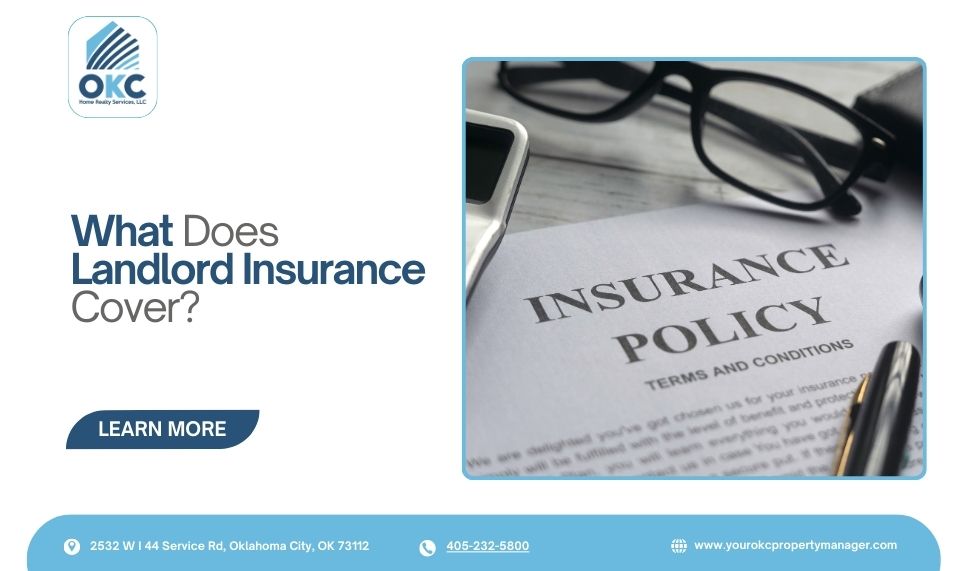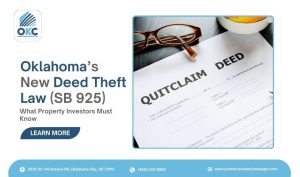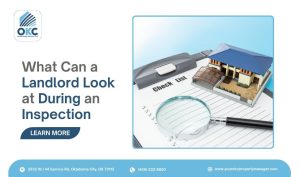Owning a rental property is a big responsibility, and protecting that investment is essential. That’s where landlord insurance comes in. It helps cover damage, accidents, and losses that can happen when you rent out a home. Many new landlords think their normal home insurance is enough, but it usually is not designed for rentals.
With over 20 years of experience managing rental property and helping landlords across Oklahoma City, I’ve seen how the right insurance policy can save a landlord thousands of dollars. From storms to broken pipes to legal claims, the unexpected can happen at any time. Having the right coverage gives you peace of mind and keeps your rental business safe and steady.
In this blog, you’ll learn what landlord insurance is, what it covers, what it doesn’t cover, and how to choose the right policy for your property.
What is Landlord Insurance?
Landlord insurance is a type of coverage made specifically for property owners who rent out homes, apartments, or other properties. It protects landlords from risks related to renting, such as property damage, tenant injuries, or loss of rental income.
For Oklahoma landlords, it can help protect both your property and your income. Key things landlord insurance covers include;
- The building or structure, including walls, roofs, and permanent fixtures
- Landlord-provided contents like furniture, appliances, or carpets that you supply
- Liability protection in case a tenant or visitor gets injured on your property
This insurance is essential because it focuses on rental-specific risks that standard home insurance does not cover.
Why Standard Home Insurance Isn’t Enough for Rentals
Many landlords think their homeowner’s insurance automatically protects rental properties, but that’s not true. Home insurance is intended for owner-occupied properties, not income-generating rentals.
Here’s why standard home insurance isn’t enough:
- Tenant caused damage: Fires or accidents caused by tenants may not be covered
- Limited liability: injuries to tenants or visitors might not be fully protected
- Loss of rental income: if your property becomes uninhabitable, your homeowner’s policy usually won’t pay for lost rent
Landlord insurance addresses these gaps by covering damage caused by tenants, protecting rental income, and providing legal support if someone sues. For Oklahoma landlords, this coverage is especially important due to the risk of storms, tornadoes, and other weather events that can damage rental properties.
What Does Landlord Insurance Cover?
Landlord insurance protects property owners from financial losses related to renting out a home or other rental property. It covers several areas, depending on the policy you choose. Understanding each type of coverage helps landlords safeguard both their property and rental income.
1. Property or Building Coverage
This coverage protects the physical structure of your rental property, including:
- Walls, roof, and foundation: protection from storms, fire, tornadoes, and other disasters
- Garages, fences, and outbuildings, not just the main building
- Permanent fixtures: built-in appliances, plumbing, and electrical systems
2. Landlord Contents Coverage
If you rent out a furnished property, contents coverage protects the items you supply for your tenants. Without it, replacing furniture or appliances after damage can cost hundreds or thousands of dollars. Typically, the coverage includes:
- Furniture, carpets, and curtains
- Kitchen appliances like stoves or refrigerators
- Other items you supply for tenants
3. Liability Coverage
Liability coverage is one of the most important parts of landlord insurance. It protects you if a tenant or visitor gets injured on your property or if you’re legally responsible for damage to someone else’s property.
- Tenant or visitor injuries: covers medical and legal costs if sued
- Legal defense costs: attorney fees and court costs
Example: slip and fall accident or water damage affecting neighbors.
4. Loss of Rent or Rental Income Protection
This rental property insurance covers lost income if your property becomes uninhabitable due to a covered event, such as:
- Fire, storm, or vandalism
- Structural damage is preventing occupancy
5. Alternative Accommodation Costs
Some landlord insurance policies also cover temporary housing costs if your tenants cannot live in the property. This can include:
- Hotels, motels, or short-term rental accommodations
- Costs associated with relocating tenants during major repairs
6. Optional or Add-on Coverage
Many landlords customize their policies with optional coverage to match their property and tenant type. Common add-ons include:
- Accidental damage cover: protects against unintentional tenant damage
- Malicious or intentional damage: tenant vandalism
Landlord insurance isn’t just about protecting the building; it’s about protecting your income, your tenants, your peace of mind, and overall risk management. By understanding each type of coverage and tailoring it to your property, you can handle unexpected situations without financial stress.
What Landlord Insurance Does Not Cover?
Knowing what landlord insurance doesn’t cover is just as important as knowing what it does cover. This helps prevent surprises when you file a claim and ensures you’re properly protected.
Most landlord insurance policies will not cover the following:
- Wear and Tear: routine maintenance, like painting, fixing worn carpets, or replacing old plumbing, is the landlord’s responsibility.
- Pest Infestations: termites, bed bugs, or rodents aren’t usually covered.
- Mold and Damp: mold caused by poor ventilation or lack of maintenance is excluded
- Tenant Belongings: policies cover landlord-provided items, not the tenant’s furniture or personal property.
- Floods and Earthquakes: standard coverage may not include these events. Separate policies or endorsements are often required in flood-prone areas of Oklahoma.
- Intentional Damage by the Landlord: the damage that is caused on purpose is never covered.
Now that you know what is and isn’t covered, let’s see what affects your landlord insurance premiums.
Factors that Affect Landlord Insurance Premiums
Not all landlord insurance policies cost the same. Your premium depends on several factors that help insurers understand how risky your property is to cover. Knowing these factors can help you plan your budget and even reduce your insurance costs over time.
1. Property Location and Type
Where your rental is located plays a huge role in pricing. Insurers look at local risks, building type, and common weather events.
- Neighborhood Risk Levels: areas with more crime may have higher premiums
- Weather Patterns: Oklahoma sees tornadoes, strong winds, and hailstorms, which can increase building coverage costs.
- Property Type: Houses, duplexes, and multi-unit buildings each carry different risks. Similarly, larger buildings often cost more to insure because repairs can be more expensive.
Adding safety features like strong roofing, shutters, or better fencing can sometimes help reduce rates.
2. Type of Tenants
Insurers also care about who lives in your rental. Some tenant groups are considered higher risk, and that can affect your premium.
Common tenant categories include:
- Families: Usually, families are seen as low risk, which may lower premiums.
- Students: Students are considered higher risk due to frequent turnover and possible property damage.
This doesn’t mean you shouldn’t rent to certain groups; it just means you may need the right type of protection.
3. Safety and Security Features
The safer your rental property is, the lower your risk and often, your premium. Some helpful safety features include:
- Deadbolt locks
- Smoke detectors
- Fire extinguishers
- Security alarms
- CCTV camera
Most insurers reward landlords who take safety seriously because it reduces the chance of claims.
4. Level of coverage and Add-Ons
The more protection you choose, the more you’ll pay.
Your premium depends on:
- Coverage limits
- Optional extras
- Lower deductibles
Choosing the right mix depends on your property, your tenant type, and how much risk you want to manage.
5. Building Age and Condition
Older homes often come with more risk due to aging systems and materials. Some key factors of older units are:
- Old wiring or plumbing
- Roofing age
- Foundation condition
- General wear and tear
Well-maintained older homes may still receive better rates compared to poorly maintained newer ones.
How to Choose the Right Landlord Insurance Policy
Choosing the right landlord insurance policy doesn’t have to feel confusing or overwhelming. The key is to match the policy to your property, your tenants, and your risks. A well-chosen policy protects your rental income and keeps you prepared for unexpected problems, whether it’s storm damage, a sudden repair, or tenant-related issues.
Below are the steps and factors Oklahoma landlords should consider when picking the right coverage.
1. Assess Your Property’s Risk Profile
Before getting quotes, take a clear look at your rental property and the risks it may face. Think about:
- Location Risks: Is the home in an area of Oklahoma prone to tornadoes, hailstorms, or flooding?
- Property Type: single-family homes, duplexes, condos, and older houses all have different risk levels.
- Age and Condition of the Property: Older homes may need more coverage for plumbing, electrical work, or roof concerns.
- Tenant Type: families, students, short-term renters, and professionals all have different levels of risk.
This helps you understand what kind of coverage is a must-have and what should be optional.
2. Compare Quotes and Providers
Don’t settle for the first quote you receive. Different insurance companies offer different prices, perks, and limits. Things to compare are:
- Coverage Included: building, liability, contents, rent loss, etc.
- Optional Add-Ons: like rent guarantee, legal cover, or malicious damage.
- Premium Costs: monthly or yearly payments
- Excess: what you pay before insurance pays
- Customer Service and Claim Response Times: Some insurers are faster and easier to work with.
3. Understand Policy Wording and Hidden Clauses
Insurance policies can sometimes include conditions that are easy to overlook. Make sure you check:
- Exclusion: Things not covered, like mold, pests, wear and tear, or gradual leaks.
- Maintenance Requirements: Some policies require regular inspections
- Security Conditions: certain locks or alarms may be required for full protection.
- Vacancy Rules: Some policies limit coverage if your property is empty for more than 30-60 days.
- Payment Conditions: Some claims may only be valid if rent is paid through official channels.
Take your time reading. If there is anything confusing, ask the insurer to explain in plain language.
4. Choose a Policy that Fits Your Rental Strategy
Not all rentals are the same, so choose a policy that fits how you run your property:
- Short-term rentals like Airbnb may need accidental damage or contents cover.
- Long-term rentals benefit from rent guarantee and liability cover
- Older homes around OKC, Norman, and Midwest City may need higher building coverage limits
- Multi-unit properties or multiple rentals may benefit from bundled policies for cost savings.
Your insurance should support your rental style, not get in your way.
How to File a Landlord Insurance Claim?
Filing a landlord insurance claim can feel overwhelming, especially if your property has been damaged or a tenant is involved. Knowing the process beforehand helps you act quickly and increases the chances of a smooth, successful claim.
Here’s the step-by-step claim process:
1. Notify Your Insurer Immediately: Contact your insurance company as soon as possible after an incident. Delays can lead to denied claims.
2. Document the Damage: Take clear photos or videos of the property, landlord-owned items, and any affected areas.
3. Provide Details: Give your insurer a written description of what happened, including dates, causes, and any other relevant information.
4. Complete Claim Forms: Your insurance company will provide forms to fill out. Accuracy is essential to avoid delays.
5. Allow Inspection: An adjuster may visit your property to assess the damage. Ensure the property is accessible and all damaged areas are visible.
6. Keep Receipts and Records: For repairs, replacement costs, or temporary accommodation, keep all invoices and proof of payments.
Common Mistakes to Avoid
- Delayed Reporting: waiting too long to notify your insurer can result in denied claims
- Incomplete Documentation: photos, receipts, or descriptions are crucial. Missing items can slow the process
- Attempting Repairs Too Early: some insurers need to inspect the damage before repairs start. Always check first.
- Ignoring Exclusions: know your policy’s limits. For example, flood damage may not be covered without a separate policy.
Legal and Regulatory Considerations for Landlords
Being a landlord, it’s important to understand the legal and regulatory landscape surrounding rental properties and landlord insurance. Following these requirements not only keeps you compliant but also helps protect your investment and reduce risk.
1. Regional or National Insurance Requirements
While Oklahoma law does not mandate landlord insurance, it is highly recommended for all property owners who rent out their homes. Insurance protects you against risks that could otherwise leave you liable for large expenses. Certain types of rental properties, like multi-unit buildings, may face additional coverage expectations from local authorities or neighborhood associations.
2. Mortgage Lender Requirements
If your property is financed with a mortgage, your lender may require proof of insurance. Lenders typically want property or building coverage at a minimum to protect the loaned investment. So, failing to maintain adequate insurance could violate your mortgage terms, potentially resulting in penalties or forced insurance by the lender.
3. Landlord Responsibilities for Property Maintenance and Safety
The landlord insurance works best when the property is well-maintained and safe. Some of the legal and practical responsibilities include:
- Routine Inspections and Maintenance: Check smoke detectors, plumbing rods, and HVAC systems
- Safety Compliance: Ensure the property meets Oklahoma building codes and safety standards
- Tenant Health and Safety: Address hazards promptly to reduce liability risks
- Documentation: Keep records of inspections, repairs, and communications with tenants.
Making a claim successfully is only one part of being a landlord. You also need to comply with Oklahoma laws and lender requirements, maintain safety standards, and understand your legal responsibilities to tenants.
Final Thoughts on What Does Landlord Insurance Cover
Landlord insurance is more than just a policy; it’s a crucial safety net that protects your property, rental income, and peace of mind. From buildings and content coverage to liability protection and loss of rent, having the right coverage ensures you can handle unexpected events without financial stress
Oklahoma landlords face different challenges, from unpredictable weather to property maintenance demands. By understanding what the rental property insurance covers, knowing its exclusions, and combining it with practical property management strategies like regular inspections, tenant screening, and clear documentation, you can safeguard your rental investment and reduce risks.
While landlord insurance protects against financial loss, effective property management is the key to keeping your rentals profitable and well-maintained. If you’re looking for professional help managing your rental properties in Oklahoma City, OKC Home Realty Services offers expert property management solutions. Their team can handle everything from tenant screening to maintenance, helping you maximize returns while minimizing headaches.
Landlord Insurance FAQs
What exactly does landlord insurance cover?
Landlord insurance protects rental property owners from financial losses related to renting. It typically covers property or building damage, landlord-owned contents, loss of rent, and liability protection.
Who pays for landlord liability insurance?
The landlord is responsible for paying liability insurance. It’s part of the overall landlord insurance policy and protects you if a tenant, visitor, or neighbor is injured on your rental property or if you’re held legally responsible for property damage. Tenants are not responsible for this coverage.
Is landlord insurance expensive?
Landlord insurance costs vary based on several factors, such as property type, tenant type, coverage level, and optional add-ons. Oklahoma Landlords need to pay between $800-$1,500 per year for a standard policy, though prices vary by city, property type, and coverage.
Does landlord insurance cover tenant-caused damage?
Yes, most policies cover accidental or intentional tenant damage if you add the appropriate optional coverage. Standard policies may exclude malicious or deliberate damage, so check your policy details.

Author
Scott Nachatilo is an investor, property manager and owner of OKC Home Realty Services – one of the best property management companies in Oklahoma City. His mission is to help landlords and real estate investors to manage their property in Oklahoma.
 (
(









